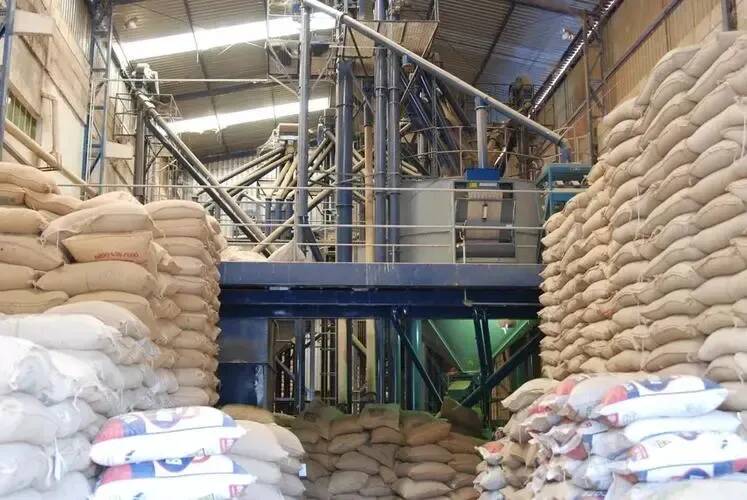Minimum wage rises! But more than a thousand workers still strike in Vietnam
According to the Labor Department of Vietnam's Pyeongyang Province, there was a workers' strike at hong fu Co., Ltd. in Vietnam on July 20. According to reports, the company is a furniture company, as of July 21, a total of 422 workers went on strike for two consecutive days and did not go to work.
The reason for this strike is that on July 17, the company issued a notice that it would give all its employees a pay rise, but did not specify how much, only that it would be raised in accordance with relevant laws and regulations, and that the approval was not signed by a legal person or sealed by the company. So the workers decided to go on strike, demanding that the company know exactly how much each worker's salary would be raised.
At present, the provincial labor department has instructed the company to adjust the wages of each worker in accordance with resolution 74/2024/ND-CP, and the company has started work normally.
However, it is reported that there have been a number of strikes by workers in foreign companies during this period of time. In addition, the leader of the Federation of Labor of Pyeongyang Province said that nearly 100 workers from Chen Tai Co., Ltd. in Vietnam had stopped working. At the same time, about 1500 workers from Yupoong Co., Ltd. in Vietnam have stopped working collectively because they want to increase their wages.

Most of the shutdown is due to Vietnam's earlier new policy, after the Vietnamese National wage Council proposed that the Vietnamese government raise the regional minimum wage for enterprises by 6%. According to the different regions, they will be divided into four types of regions, each of which will have different wage increases.
As a result, these factories have been adjusting workers' wages recently, but the increase is not up to the level required by workers, causing factory workers in many companies to go on strike, and most of the strikes are concentrated in foreign-funded enterprises in southern Vietnam.

It is understood that Vietnam is the second largest coffee exporter in the world, so there are many local or international coffee enterprises in Vietnam that set up coffee cultivation, processing, transportation, import and export trade, and so on, so they have recruited a large number of workers. The policy makes Vietnamese workers happy, but for companies, it will undoubtedly greatly increase labor costs. Moreover, the present strike is only the beginning of the wave of striking. under the influence of these events, if they are not satisfied with the rate of wage increase, it may cause more workers to choose to strike.
Earlier, Vinacafe, a well-known Vietnamese coffee company, issued a financial statement saying that although it made a profit in 2023, the profit was not enough to make up for its cumulative loss of more than 1.09 trillion dong (about 311 million yuan, US $42 million). The increase in the minimum wage for workers is likely to increase the company's operating costs.
In addition, coffee cultivation in Vietnam has been affected by dry weather so far this year, resulting in a serious reduction in production. The price of coffee in Vietnam has soared to 120 million dong / ton, and according to local traders, in order to fulfill the previous contract, coffee beans have been purchased from farmers even if the price is increased, resulting in a current shortage of funds, coupled with rising workers' wages and the current market downturn, many traders may go bankrupt as a result.
Moreover, the Red Sea crisis has always affected the export of Vietnamese coffee, because the Red Sea is the main route of Eurasian routes, and the current Red Sea crisis has caused Vietnamese coffee to take a detour on the route exported to Europe, greatly increasing shipping time and costs. as a result, some buyers began to reduce the purchase of Robusta in Vietnam and turned to Robusta from other producing countries, which seriously affected the international influence of Vietnamese coffee.
According to Vietnamese customs data, Vietnamese coffee exports in the first half of this year were 893920 tons, down 11.4 percent from the same period last year. Coupled with low domestic coffee stocks, supply shortages and about four months to go before the next harvest, traders say the current predicament is expected to last until early November, during which many coffee traders are likely to go bankrupt.
Important Notice :
前街咖啡 FrontStreet Coffee has moved to new addredd:
FrontStreet Coffee Address: 315,Donghua East Road,GuangZhou
Tel:020 38364473
- Prev

Introduction to Antioquia, the coffee producing area of Colombia in South America
South America is rich in natural resources. The Andes Mountains run through almost the entire western part of South America and have the highest peak in the Americas, Mount Aconcagua. This continent is also one of the continents with many volcanoes in the world. South America is mainly tropical, with a warm and humid climate, abundant rainfall, and diverse natural resources, many in South America
- Next

It's on hot search again! Customers were approached by Bawang Tea Lady employees for giving bad reviews!
▲ Click to pay attention| Daily Boutique Coffee Culture Magazine Coffee Factory Recently, a controversial incident about customers being approached by employees of Bawang Tea Lady after negative reviews attracted attention on the Internet. Related topics also rushed to the hot search list on Weibo on Monday morning. According to Star Video, on July 20, a man released a video saying
Related
- What grade does Jamaica Blue Mountain No. 1 coffee belong to and how to drink it better? What is the highest grade of Blue Mountain coffee for coffee aristocrats?
- What are the flavor characteristics of the world-famous coffee Blue Mountain No. 1 Golden Mantelin? What are the characteristics of deep-roasted bitter coffee?
- Can I make coffee a second time in an Italian hand-brewed mocha pot? Why can't coffee be brewed several times like tea leaves?
- Hand-brewed coffee flows with a knife and a tornado. How to brew it? What is the proportion of grinding water and water temperature divided into?
- What is the difference between Indonesian Sumatra Mantinin coffee and gold Mantinin? How to distinguish between real and fake golden Mantelin coffee?
- What does bypass mean in coffee? Why can hand-brewed coffee and water make it better?
- Unexpected! Ruixing Telunsu lattes use a smoothie machine to foam milk?!
- % Arabia's first store in Henan opens into the village?! Netizen: Thought it was P's
- Does an authentic standard mocha coffee recipe use chocolate sauce or powder? Mocha Latte/Dirty Coffee/Salty Mocha Coffee Recipe Share!
- What is the difference between Vietnam egg coffee and Norway egg coffee? Hand-brewed single product coffee filter paper filter cloth filter flat solution!

